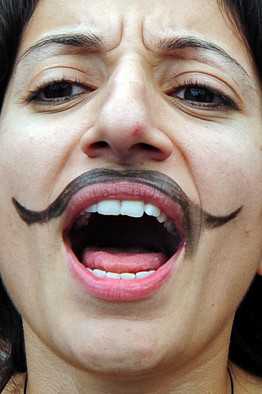By Ayla Albayrak

A women’s group has been number-crunching party lists submitted this week for Turkey’s elections on June 12, to resolve the following question: Do you still need a moustache to enter parliament?
Answer: It still helps.
Ka-Der, a women’s organization posed the moustache question ahead of the last elections in 2007. They got famous women, ranging from entertainers to businesswomen, to pose wearing fake moustaches on the covers of Turkish newspapers to persuade political parties to put forward more female candidates.
That time, only 48 women made it to Turkey’s 550-seat Parliament. As the next elections near, Ka-Der say the party lists suggest the number of women that make it into the legislature will nearly double — but still won’t get close to the 50% level the group believe would match Turkey’s claims to act as democratic role model for the Middle East.
“We calculated that in the worst case scenario, 78 women will make it to the Parliament, and in the best case, that number would reach 110,” said Cigdem Aydin, the head of Ka-Der in a telephone interview. “We are angry because so many capable women were wasted. Men see the political arena as a means to power, and they don’t want to share that power with women.”
Several Turkish women lead huge family business dynasties and have made it onto Forbes Magazine’s lists of the world’s richest and most powerful people. A woman, Umit Boyner, heads Turkey’s largest business lobby, TUSIAD. Moreover, almost half of university teaching staff in Turkey are women.
Politics, however, remains a no-fly zone. One hurdle to getting women elected is that in rural areas in particular, many women vote according to their husbands wishes. Another, is that just as moustache is a plus in Turkish politics, an Islamic-style headscarf is a minus.
Some 60% of Turkish women wear headscarves, but due to the staunchly secular character of the current constitution, women in state jobs are not allowed to cover their hair. That includes Parliament.
A group of headscarf wearing women campaigned for the Islamic-leaning AK party to put them on its list of candidates for this election, using the slogan “No headscarves — no votes.” But even the AK party, which is expected to remove headscarf restrictions when it redrafts the constitution after the elections, didn’t want to tackle that taboo. It nominated just one candidate with a headscarf.
That candidate is Gulderen Gultekin, a teacher from Antalya. The seaside city is secular territory, more famous for bikini-wearing tourists than headscarf-wearing women.
“We don’t count her,” said Nesrin Semiz, who heads the campaign, because she can’t win and probably wouldn’t insist on wearing the headscarf even if she did. “She is a teacher and removes headscarf at work. She would remove in the parliament, too.”
Perhaps the candidate with fewest hurdles to overcome is the famous folk-pop singer, Ibrahim Tatlises. He is hugely popular, close to the ruling AK party, and will run for election in his hometown of Urfa, in eastern Turkey.
What’s more, he has a pretty impressive moustache.
via Yes to Moustaches, No to Headscarves – Emerging Europe Real Time – WSJ.

Leave a Reply